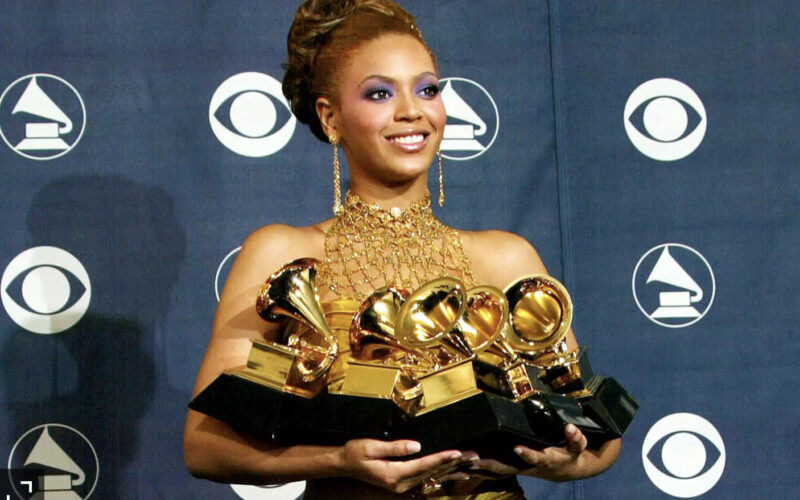Since Lauryn Hill in 1999, a Black woman has not received the Album of the Year award. Beyoncé has won 28 other Grammys, so she is not short of awards, but the big one has eluded her.
Let’s just say that Beyoncé ought to have at least two Album of the Year Grammys already: one for her 2013 self-titled, surprise release, industry-breaking LP, which included hits like “Drunk in Love,” “XO,” and “Partition,” and — perhaps most egregiously — one for her 2016 album Lemonade, which was unsurpassed. She should win, but she doesn’t, which just goes to show how annoying the Grammys have always been.
But Renaissance, who has been nominated for an incredible 88 Grammys in total (a record she shares with her husband Jay-Z), may finally take home the gold. Indeed, she should win Album of the Year because the Grammys are on shaky ground in terms of credibility and not just because Renaissance is a masterpiece on par with (and some would argue surpassing) Lemonade.
The Recording Academy has essentially made it a point not to give a Black woman Album of the Year for more than 20 years. The Miseducation of Lauryn Hill by Lauryn Hill was the latest album to experience this in 1999. Miseducation was the definitive Album of the Year, an obvious success that advanced music and the music business. It was both highly regarded by critics and a commercial juggernaut. No Black woman has since repeated that accomplishment, regardless of how well-received or innovative her album was in the 23 years since. Nor Janelle Monáe’s dystopian queer masterpiece Dirty Computer, not Mariah Carey’s megahit Emancipation of Mimi, the greatest comeback since Tina Turner questioned what love had to do with it, and not any of H.E.R.’s three nods in the category. Solange, Bey’s sister, wasn’t even put forward for the widely praised A Seat at the Table.
Beyoncé had shared the title of woman of colour with the most Album of the Year nods (three apiece) with H.E.R., Carey, and the late, great Whitney Houston prior to her most recent nod. Prior to Hill, only two Black women had received the distinction: the late, great Natalie Cole for 1991’s Unforgettable… With Love and Whitney Houston for the soundtrack to The Bodyguard (still, 30 years later, the best-selling album by a female artist).
Do honours matter today? Depending on who you ask. That recognition can open challenging doors and lead to a whole new level of success for emerging or independent artists. It might just be another honour to add to Beyoncé’s long list of achievements. However, if industry awards persist on existing and positioning themselves as judges of culture and the arts, then they should be impartial. Yes, Beyoncé has received her fair share of awards; in fact, she leads all singers in the 63-year history of the Grammys with 28 honours. which is nothing at all. She does, however, convey a message by glaringly lacking a “Album of the Year” despite having a career full of them.
The fact of the matter is, it’s practically impossible for a Black musician to win Album of the Year, as John Legend stated to EW in 2020, just before John Batiste ended a drought of more than ten years. “How many years do we have to wait before Beyoncé is passed over?”
Indeed, how many years? Bey’s 2008 single “I Am” earned her her first AotY nomination. One of the nine singles from the ambitious double album Sasha Fierce’s nine singles is the timeless hymn “Single Ladies (Put a Ring on It). She lost out to Fearless by Taylor Swift, who was 19 at the time and had previously held the record for the youngest winner in the category until When We All Fall Asleep, Where Do We Go? by 18-year-old Billie Eilish won in 2019. Nevertheless, Beyoncé broke Lauryn Hill’s previous record for the most Grammys won by a female artist in a single year with six wins for Sasha. Swift, the first woman to accomplish that milestone, did it at the astonishingly young age of 31. She would go on to win Album of the Year twice more, for 1989 in 2014 and Folklore in 2020, tying Frank Sinatra, Stevie Wonder, and Paul Simon for the most victories in that category.
It appeared as though Beyoncé might win Album of the Year. On December 13, 2013, where were you when a whole-ass visual album materialised out of nowhere? There are two distinct periods in 21st-century popular music: the pre-Beyoncé era and the Beyoncé era. The following year, and really years to come, were greatly influenced by that record, which fundamentally altered how musicians release music and how listeners consume it. Therefore, everyone was surprised when Beck won for Morning Phase with the possible exception of Beck supporters.
With the release of Lemonade in 2016, Queen Bey solidified her position as the most significant artist of her time. She outdid herself by producing a cultural touchstone whose influence is being felt today, spanning genres. By this time, Beyoncé had entirely abandoned conventional music distribution methods. Instead, she created a one-hour film, which had its HBO premiere at the same time as the album’s exclusive streaming debut on Tidal. Although “most albums sold” isn’t a criteria for Album of the Year, it’s important to note that Lemonade’s global sales of more than 2.5 million in 2016 paled in comparison to Adele’s 25’s staggering 17 million in 2015 (the year’s best-selling album and the second best-selling album of the decade behind Adele’s 21). Adele undoubtedly prevailed in that contest. Then Adele won the Grammy’s top prize, which was widely seen as an upset, even by the winner.
In her acceptance speech, Adele called Lemonade “monumental” and Beyoncé “the artist of my life,” dedicating her victory to the singer. Even though it’s undoubtedly flattering, Beyoncé has undoubtedly had to listen politely while grinning while someone else tells her what she ought to have won. The majority of the individuals are Kanye West.
All of this is not meant to imply that these musicians weren’t deserving of their awards, but how can the Recording Academy regard itself as an authoritative body if it routinely excludes Black artists from being recognised as complete, whole artists? Declaring, “This is the Album of the Year,” is a way for an artist to demonstrate their esteem within the business and the extent to which their body of work has influenced and defined popular culture. And to deny that recognition to women of colour in general, not just Beyoncé, is to downplay the significance of their influence, the rigour of their talent, and the breadth of their creative expression.










